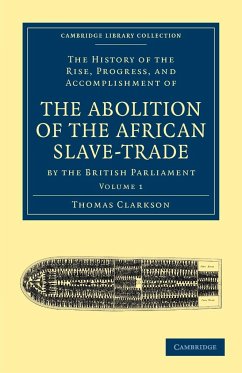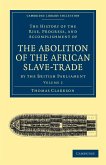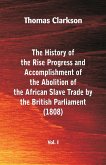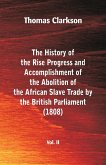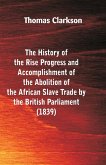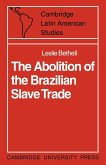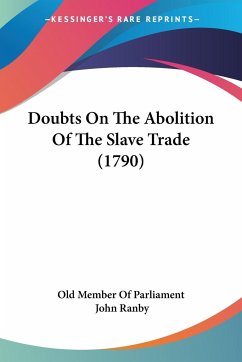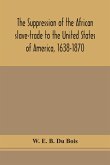Thomas Clarkson
The History of the Abolition of the African Slave-Trade by the British Parliament - Volume 1
Thomas Clarkson
The History of the Abolition of the African Slave-Trade by the British Parliament - Volume 1
- Broschiertes Buch
- Merkliste
- Auf die Merkliste
- Bewerten Bewerten
- Teilen
- Produkt teilen
- Produkterinnerung
- Produkterinnerung
A unique contemporary record of the campaign to abolish the African slave trade, first published in 1808.
Andere Kunden interessierten sich auch für
![The History of the Abolition of the African Slave-Trade by the British Parliament - Volume 2 The History of the Abolition of the African Slave-Trade by the British Parliament - Volume 2]() Thomas ClarksonThe History of the Abolition of the African Slave-Trade by the British Parliament - Volume 262,99 €
Thomas ClarksonThe History of the Abolition of the African Slave-Trade by the British Parliament - Volume 262,99 €![The History of the Rise, Progress and Accomplishment of the Abolition of the African Slave Trade by the British Parliament (1808), Vol. I The History of the Rise, Progress and Accomplishment of the Abolition of the African Slave Trade by the British Parliament (1808), Vol. I]() Thomas ClarksonThe History of the Rise, Progress and Accomplishment of the Abolition of the African Slave Trade by the British Parliament (1808), Vol. I13,99 €
Thomas ClarksonThe History of the Rise, Progress and Accomplishment of the Abolition of the African Slave Trade by the British Parliament (1808), Vol. I13,99 €![The History of the Rise, Progress and Accomplishment of the Abolition of the African Slave Trade by the British Parliament (1808), Vol. II The History of the Rise, Progress and Accomplishment of the Abolition of the African Slave Trade by the British Parliament (1808), Vol. II]() Thomas ClarksonThe History of the Rise, Progress and Accomplishment of the Abolition of the African Slave Trade by the British Parliament (1808), Vol. II13,99 €
Thomas ClarksonThe History of the Rise, Progress and Accomplishment of the Abolition of the African Slave Trade by the British Parliament (1808), Vol. II13,99 €![The History of the Rise, Progress and Accomplishment of the Abolition of the African Slave-Trade, by the British Parliament (1839) The History of the Rise, Progress and Accomplishment of the Abolition of the African Slave-Trade, by the British Parliament (1839)]() Thomas ClarksonThe History of the Rise, Progress and Accomplishment of the Abolition of the African Slave-Trade, by the British Parliament (1839)20,99 €
Thomas ClarksonThe History of the Rise, Progress and Accomplishment of the Abolition of the African Slave-Trade, by the British Parliament (1839)20,99 €![The Abolition of the Brazilian Slave Trade The Abolition of the Brazilian Slave Trade]() Leslie BethellThe Abolition of the Brazilian Slave Trade67,99 €
Leslie BethellThe Abolition of the Brazilian Slave Trade67,99 €![Doubts On The Abolition Of The Slave Trade (1790) Doubts On The Abolition Of The Slave Trade (1790)]() Old Member Of ParliamentDoubts On The Abolition Of The Slave Trade (1790)16,99 €
Old Member Of ParliamentDoubts On The Abolition Of The Slave Trade (1790)16,99 €![The suppression of the African slave-trade to the United States of America, 1638-1870 The suppression of the African slave-trade to the United States of America, 1638-1870]() W. E. B. Du BoisThe suppression of the African slave-trade to the United States of America, 1638-187016,99 €
W. E. B. Du BoisThe suppression of the African slave-trade to the United States of America, 1638-187016,99 €-
-
-
A unique contemporary record of the campaign to abolish the African slave trade, first published in 1808.
Produktdetails
- Produktdetails
- Verlag: Cambridge University Press
- Seitenzahl: 588
- Erscheinungstermin: 22. Juli 2010
- Englisch
- Abmessung: 216mm x 140mm x 34mm
- Gewicht: 819g
- ISBN-13: 9781108020008
- ISBN-10: 1108020003
- Artikelnr.: 31395640
- Verlag: Cambridge University Press
- Seitenzahl: 588
- Erscheinungstermin: 22. Juli 2010
- Englisch
- Abmessung: 216mm x 140mm x 34mm
- Gewicht: 819g
- ISBN-13: 9781108020008
- ISBN-10: 1108020003
- Artikelnr.: 31395640
Thomas Clarkson was an English abolitionist who died on September 26, 1846. He was born on March 28, 1760, and died on September 26, 1846. He helped start an organization called the Society for Effecting the Abolition of the Slave Trade, which is also known as the Society for the Abolition of the Slave Trade. He also worked to get the Slave Trade Act of 1807 passed, which put an end to the British slave trade. He stopped fighting in 1816 and was one of the twelve people who started the Society for the Promotion of Permanent and Universal Peace with his brother John. In his later years, Clarkson worked to end slavery all over the world. In 1840, he gave the most important speech at the first meeting of the British and Foreign Anti-Slavery Society in London. This group worked to end slavery in other countries. He was made a deacon in 1783, but he never went on to become a priest.¿
1. Introduction
2. Those who favoured the cause of the Africans previously to 1787
3. Forerunners continued to 1787
4. Second, of the Quakers in England
5. Third, of the Quakers in America
6. Facility of junction between the members of these three different classes
7. Fourth consists of Dr. Peckard, then of the author
8. Fourth class continued - Langton, Baker and others
9. Fourth class continued - Sheldon, Mackworth and others
10. Fourth class continued - author enlarges his knowledge
11. History of the preceding classes, and of their junction
12. Author endeavours to do away with the charge of ostentation
13. Proceedings of the Committee
14. Author visits Bristol to collect information
15. Mode of procuring and paying seamen in that trade
16. Author meets with Alexander Falconbridge
17. Visits Liverpool
18. Manner of procuring and paying seamen at Liverpool in the slave-trade
19. Author proceeds to Manchester
20. Labours of the Committee during the author's journey
21. Further labours of the Committee to February 1788
22. Progress of the cause to the middle of May
23. Progress to the middle of July.
2. Those who favoured the cause of the Africans previously to 1787
3. Forerunners continued to 1787
4. Second, of the Quakers in England
5. Third, of the Quakers in America
6. Facility of junction between the members of these three different classes
7. Fourth consists of Dr. Peckard, then of the author
8. Fourth class continued - Langton, Baker and others
9. Fourth class continued - Sheldon, Mackworth and others
10. Fourth class continued - author enlarges his knowledge
11. History of the preceding classes, and of their junction
12. Author endeavours to do away with the charge of ostentation
13. Proceedings of the Committee
14. Author visits Bristol to collect information
15. Mode of procuring and paying seamen in that trade
16. Author meets with Alexander Falconbridge
17. Visits Liverpool
18. Manner of procuring and paying seamen at Liverpool in the slave-trade
19. Author proceeds to Manchester
20. Labours of the Committee during the author's journey
21. Further labours of the Committee to February 1788
22. Progress of the cause to the middle of May
23. Progress to the middle of July.
1. Introduction
2. Those who favoured the cause of the Africans previously to 1787
3. Forerunners continued to 1787
4. Second, of the Quakers in England
5. Third, of the Quakers in America
6. Facility of junction between the members of these three different classes
7. Fourth consists of Dr. Peckard, then of the author
8. Fourth class continued - Langton, Baker and others
9. Fourth class continued - Sheldon, Mackworth and others
10. Fourth class continued - author enlarges his knowledge
11. History of the preceding classes, and of their junction
12. Author endeavours to do away with the charge of ostentation
13. Proceedings of the Committee
14. Author visits Bristol to collect information
15. Mode of procuring and paying seamen in that trade
16. Author meets with Alexander Falconbridge
17. Visits Liverpool
18. Manner of procuring and paying seamen at Liverpool in the slave-trade
19. Author proceeds to Manchester
20. Labours of the Committee during the author's journey
21. Further labours of the Committee to February 1788
22. Progress of the cause to the middle of May
23. Progress to the middle of July.
2. Those who favoured the cause of the Africans previously to 1787
3. Forerunners continued to 1787
4. Second, of the Quakers in England
5. Third, of the Quakers in America
6. Facility of junction between the members of these three different classes
7. Fourth consists of Dr. Peckard, then of the author
8. Fourth class continued - Langton, Baker and others
9. Fourth class continued - Sheldon, Mackworth and others
10. Fourth class continued - author enlarges his knowledge
11. History of the preceding classes, and of their junction
12. Author endeavours to do away with the charge of ostentation
13. Proceedings of the Committee
14. Author visits Bristol to collect information
15. Mode of procuring and paying seamen in that trade
16. Author meets with Alexander Falconbridge
17. Visits Liverpool
18. Manner of procuring and paying seamen at Liverpool in the slave-trade
19. Author proceeds to Manchester
20. Labours of the Committee during the author's journey
21. Further labours of the Committee to February 1788
22. Progress of the cause to the middle of May
23. Progress to the middle of July.

